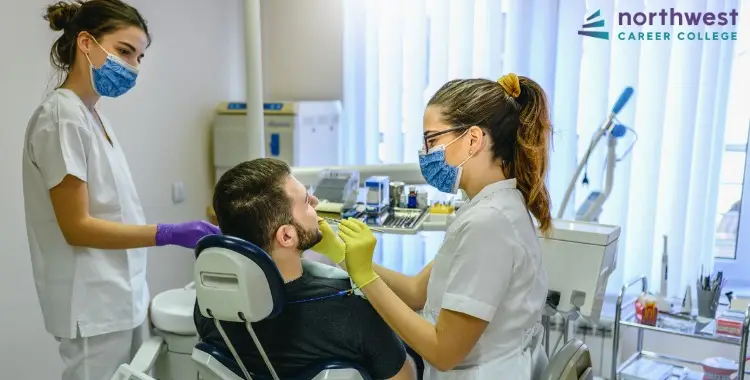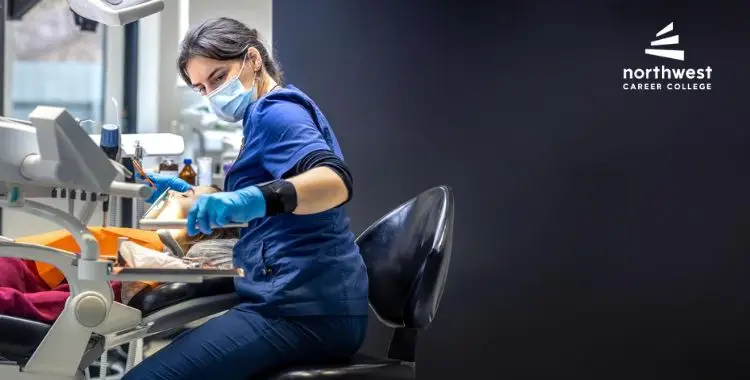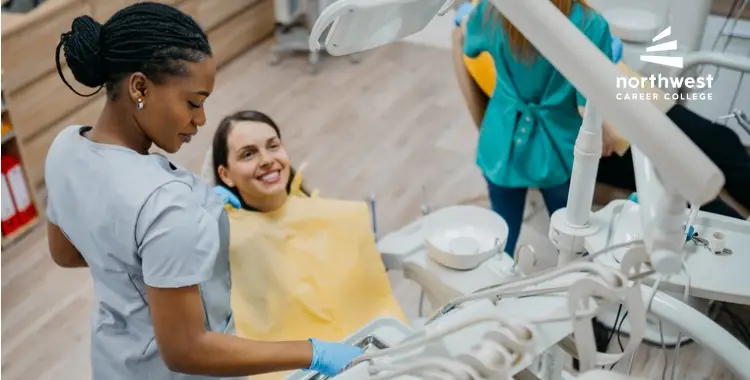Anatomy of a Dental Assistant: What You Need to Know
- Dental Assistant
- October 3, 2024
- 1.7k views
- 5 min read

Imagine being the go-to person in a dental office who keeps everything running smoothly and helps make each patient’s visit successful. That’s the role of a dental assistant. Dental assistants are the backbone of the dental team, providing crucial support to both the dentist and the patients.
According to the Bureau of Labor Statistics, the need for dental assistants is expected to grow by 8% from 2023 to 2033, showing how important this job is in health care. Let’s now discuss the anatomy of the dental assistant and understand what makes the dental assistant so crucial in the dental office.
Table of Contents
What is a Dental Assistant?
The dental assistant is employed with the dentist to assist in patient care, prepare the instruments, and ensure all items are ready for treatment. They can help during the treatment and prepare before and after it. It is a gratifying and vital job that includes technical skills and direct patient care.
The dental assistant performs tasks such as taking patients’ X-rays, sterilizing instruments, scheduling dental appointments, and easing nervous patients. They often act as a liaison between the patient and dentist to keep the flow of a dental visit smooth for all involved.
A Mind Always Judging
Anticipation is one of the most critical skills a dental assistant must have. They need to stay alert and think ahead during every situation in the dental clinic. While assisting the dentist during procedures, a dental assistant must know what the dentist will need next, have the correct instruments ready, and ensure they are sterile and positioned correctly.
This constant awareness allows the dentist to focus and work efficiently, knowing their assistant is always a step ahead. Quick thinking and sharp attention to detail keep the dental office running smoothly.
The Eyes Have It All
This work requires dental assistants to keep sharp eyes on minimal details. Attention to detail is significant on many fronts: noticing something that seems wrong in a patient’s chart, keeping track of instruments during any procedure, and watching for signs that could denote discomfort or pain from the patient.
This makes them very observant, able to read situations quickly and correctly, maintain psychology, and prevent mistakes to best care for patients. The details that may easily be overlooked are those that dental assistants are trained to notice and take care of effectively.
Mysterious Chains on the Uniform
If you’ve ever visited a dental clinic, you may have noticed the assistants wearing what looks like a chain or lanyard on their uniforms. These are often used to hold essential tools or identification cards, making it easy for them to access what they need quickly. Being organized is critical in a busy dental office; these small details help dental assistants stay prepared.
Dry, Chapped Hands
A dental assistant’s hands are never idle. Their hands are always in use, from cleaning and sterilizing the instruments to attending a procedure. Moreover, they always wash their hands and put on gloves, which may also result in dehydrated, sore skin.
It may not be a big deal, but having dried hands is uncomfortable. Many dental assistants carry hand lotion so their skin will not get too irritated, especially after a long day of serving patients.
Backache and Aching Feet
Sometimes, being a dental assistant usually involves standing through most of the time and bending over to assist with some procedures. It may mean an aching back and tired feet by day’s end. A dental assistant is always on the move, whether to help patients, set up equipment, or do whatever it takes to keep the office running smoothly.
Many dental assistants learn to practice good posture and take breaks when possible to avoid long-term pain. Comfortable shoes also make a big difference since they spend most of their time on their feet.
Common Physical Complaints among Dental Assistants:
- Working in a standing position for prolonged periods.
- Bending to help the dentist.
- Aching feet and back from constant standing.
- Despite the demands of their job, most dental assistants find their work fulfilling, knowing they help the people in the community with their oral health.
- A warm heart.
Beyond the tools and technical skills, the heart of a dental assistant is patient care. Many people are apprehensive about seeing a dentist, and that is where the kindness of a dental assistant comes in. They can often be the first point of contact for the patients and help them get comfortable before a procedure starts.
With the ability to empathize with the patients, dental assistants ease any nerve that may characteristically precede a dental visit and reassure them during the visits. For this care, they become so important to the patients and the dental team.
Conclusion:
Dental assistants are not just helpers; they are indispensable in the smooth running of a dental office and the best patient care. From sharpness of the mind to minute observation skills, from using their sharp minds and attention to detail down to the physical challenges of the job, dental assistants help out in whatever way possible day in and day out.
If you want to start your career as a dental assistant, visit us today at Northwest Career College and enroll yourself in our Dental Assistant Program. Hands-on training and flexible pay will get you going with your rewarding career in as little as nine months!





